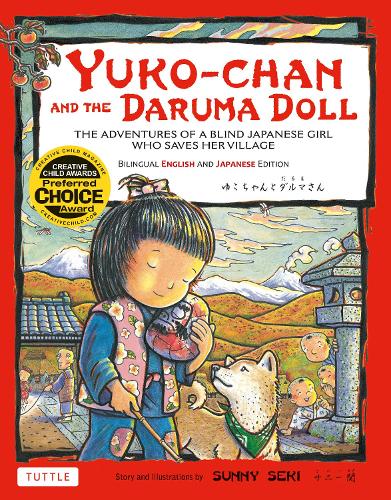
Yuko-chan and the Daruma Doll: The Adventures of a Blind Japanese Girl Who Saves Her Village - Bilingual English and Japanese Text
(Hardback, Bilingual edition)
Publishing Details
Yuko-chan and the Daruma Doll: The Adventures of a Blind Japanese Girl Who Saves Her Village - Bilingual English and Japanese Text
By (Author) Sunny Seki
Tuttle Publishing
Tuttle Publishing
10th March 2012
Bilingual edition
United States
Classifications
Children
Fiction
813.6
Physical Properties
Hardback
32
Width 216mm, Height 279mm
510g
Description
Retells the story about Yuko-chan, a little blind orphan-girl who demonstrates optimism and a spirit of survival throughout her adventures. Yuko-chan created the famous Daruma doll (a toy that arights itself no matter how many times it is tipped), upon seeing a real Daruma doll, readers will feel connected to the spirit it represents; a true symbol of resilience to never give up, no matter the obstacles.
"Seki tells us not only a beautiful story, but on every page he has richly painted images of Yuko-Chan, her Daruma Dolls, and her village that bring the wordsboth in English and in Japaneseto life." Story Circle Book Reviews
"It's a lovely book that is wonderful to read again and again. It teaches wonderful lessons about being resourceful and brave. It is well told and entertaining. I love the positive story, the beautiful illustrations, and the introduction to some aspects of Japanese culture. At the end of the book there is a list of cultural notes that defines Daruma, Daruma Doll, the Daruma Doll Festival, Daruma Games, and Gourds." The Picture Book Review
Reviews
"Daruma dolls are traditional Japanese talismans of good luck and resilience, often given as a gift to encourage the recipient to persevere in reaching a personal goal. The heartening sentiment behind them is expressed in this storyBrilliantly colored and delightfully detailed illustrations are the true highlight here. The use of bold line gives the impression of woodblock prints and cleverly echoes the broad paint strokes that decorate Daruma dolls. Pages are attractively laid out, and characters' faces are expressive and slightly cartoonish, holding great appeal for young audiences." --School Library Journal
"Seki's friendly illustrations supply a wealth of visual information about pre-WWII rural Japan, showing farmhouse interiors, a temple with a rock garden and a schoolroom, and a village festival. His story is a character-building tale about an orphan girl named Yuko, whose blindness doesn't prevent her from participating fully in village life. Lost in the snow one winter day, she realizes that the tea frozen in the bottom of her tea gourd makes the gourd reorient itself when it's knocked over, reminding her of the Buddhist teacher Daruma and his encouraging words: "If you fall down seven times, you should get up eight times!" Sales of the Daruma doll she designs save her village, whose crops have been ruined by a volcanic eruption. With Japanese text that parallels the English on every page, this is likely to find its most enthusiastic audience among students of Japanese language or culture." --Publishers Weekly
"Their crops devastated by a volcano, the villagers of Takasaki struggle to recover until Yuko-chan, an orphaned blind girl, envisions a way they can recover. After an accident, she tips over her gourd of tea, but the frozen tea always returns it upright, reminding her of Daruma's maxim that "If you fall down seven times, you should get up eight times." Yuko-chan suggests that the town make "Daruma Dolls" from gourds and sell them, a craft that saved Takasaki and continues to this day. [] Cartoon-style art features bright colors and pictures filled with traditional Japanese activity. An attractive glimpse of Buddhist images and ideas, this original story fills a unique niche for libraries." --Booklist
Author Bio
Sunny Seki is the award-winning author and illustrator of The Last Kappa of Old Japan and The Tale of the Lucky Cat. A native of Japan, Sunny studied illustration at Pasadena Art Center of Design. Sunny presents his books and other Japanese folktales at festivals and schools, invigorating his storytelling through shadow puppetry. Sunny is the leader of a Japanese senryu poetry group. He published Gardeners' Pioneer Story, an account of the 100-year history of Japanese gardeners through the sensitive senryu poems created by this group of immigrants. Sunny is now documenting the milestones of Japanese Americans in North America, again through their senryu poetry. Sunny, his wife Judy and their nine children live in San Gabriel, CA.
